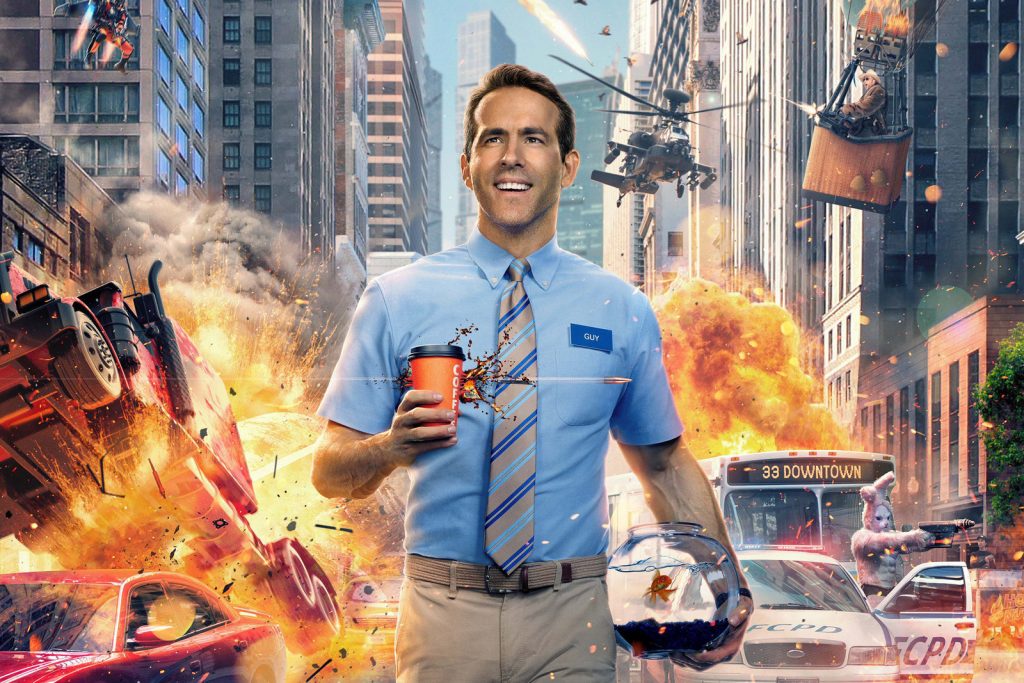Do you feel like every day is the same and like there is possibly something more to life? Good news for you, your reality is a computer game so you have endless possibilities! Or so you think. I hereby welcome you to the life of Guy, a non-playable character (NPC) in the hypothetical open-world video game Free City in the film Free Guy. Word of warning, this post may include spoilers for the film Free Guy.
The film Free Guy touches upon current matters such as the world of (open-world) video games, live streaming, and self-learning algorithm. The moral message of the film is that the world is not what it seems and what matters is what you make of it. However, I believe there is also another message behind it and that is: What does the film tell us about the digital society we live in?

Bron: FOX (2019) Free Guy [Photograph] Manners. https://www.manners.nl/free-guy-trailer-ryan-reynolds/
Digital Society
Our society today is often referred to as a digital society but what does it mean to live in a digital society? Author Simon Lindgren describes the ‘digital society’ as digital media and society merged together. More specifically, in his words:
[…] society as affected by digitally networked communication tools and platforms, such as the internet and social media.
Simon Lindgren, Digital Media and Society (London: SAGE, 2017), 4.
In the sense of the everyday world, it can be understood that people spend a considerable amount of time in a ‘digital world’, meaning that we experience the world at large through digital devices such as smartphones. But what if our whole society was digital and we literally lived in a virtual world? In the case of Guy in Free Guy, an NPC in Free World is very repetitive as is soon to be found out during the first half of the film. Everyday Guy gets up and puts on the same set of clothes to go out and perform exactly the same sort of tasks as a worker at the local bank. The same bank robbery takes place every day by ‘the sunglasses’. An important division in Free World is that the players in the world all wear sunglasses while none of the NPC’s do. The sunglasses allow players to take on missions and collect rewards, such as money, within the video game. The players level up while the NPC’s ideally stay intact and merge into the background. Guy, on the other hand, is able to do things that NPC’s normally would not be able to do due to his programming as self-learning algorithm. He manages to collect sunglasses and learns to play the game as if he were a player. This notion of self-awareness is what enables him to manipulate his environment and make a difference in it. Therefore, the conclusion of the moral message of the movie can easily be made to that the world is what you make of it which also comfortably translated into a human understanding of how the ‘real’ world works. In other words, it is easy to understand and transfer onto the reality we know and are familiar with. But how do we know if self-learning algorithms acknowledge the world in the same way as humans do?
Reality of self-learning algorithms
Let’s move away from the film world and take a step into the real world. All of us have various first ‘digital’ memories ranging from the first video game we properly got into to opening our first social media account. But has any of us stopped to give it a second thought that digital beings, in the form of Artificial Intelligence (AI) built into human-like robots, are actually surfacing that have ‘real’ memories? A learning algorithm that is built into machines and takes on a life of its own and is able to interact with humans and other robots alike. Mimicking human emotions and lingo in a way that borders on uncanny. Simon Lindgren notes in his book about Digital Media and Society (2017) that social science has to take into account how (new) media influences communication between people and can be a part of transforming and evolving how we communicate with each other. After all, media is everywhere.
Sophia
Now, I ask myself whether AI robots can be categorized as media or technology. Digital media is part of technology and AI is definitely a technology that mediates. However, it is not strictly used for communication or to mediate from one person to another. Or at least not to mediate between humans, but then the question remains whether human-like robots are to be considered as persons or not. This brings me to whether the human factor is needed when it comes to media. Obviously, technology and machines have been built and developed by humans and can be altered by humans, but once the human has largely done its job and the AI starts learning and developing on its own – where do humans then stand in the light of the machine?
A curious case is Sophia, she is the first robot citizen and has citizenship in Saudi Arabia. She was built and developed by the Hong Kong based company Hanson Robotics. She has appeared in numerous interviews and received worldwide attention and publicity. In an article by Forbes, it is claimed that Sophia was made to help humans towards a better future.
Therefore, it can be said that Sophia has a noble goal to help the future. But the paradox between comparing Guy from Free Guy and the robot Sophia is the gap between video games and reality. Guy only exists in his own reality and is solely able to make a difference there. Sophia exists in the ‘real’ human world and is able to make a difference here. While she is young and still has a lot to learn, I think there is little concern to be had. That being said, humans are barely scratching the surface of AI technology. So we better stay on our toes and be ready to learn and work together with what may comes our way in the future.
References and further readings
Lindgren, Simon. Digital Media and Society, London: SAGE, 2017, 4.
About robot rights:
Robot Rights by David J. Gunkel
‘Robots deserve human rights’: Why activists want to protect machines from their creators
Essay: Do human rights activists have a right to concern over developments in robotics inc AI
Do Robots Deserve Legal Rights?
Latest robot news:
Elon Musk unveils Tesla Bot, a humanoid robot that uses vehicle AI



First things first: AHHH I LOVED THAT MOVIE!!! I, too, almost wrote my blog post about this movie. It actually made me think a lot about digital life as well and that we might live in such a game as well. I mean how could we know, this is not the case, right? Loved to read about this in your post and I 100% agree with your conclusion, that in the end we shape our own reality.
By the way, there is this interactive series on Netflix called ‘Black Mirror: Bandersnatch’. Maybe you have seen it before, but they also created a sort of mini game where you can make decisions and are led down different paths. So whatever you choose to do affects the ending of your game and Netflix also learns from your decisions during the game, sort of like an AI.
Thank you for your comment Kyra!! I know right?! I was actually pleasantly surprised by the film I must say, I didn’t have any expectations whatsoever before watching it. Which I think was actually a good thing because that way I could just enjoy it for what it is! Bandersnatch is of course more layered, if only for the obvious reason that it’s interactive so you can literally make your own way through the story. I’ve watched/played it a couple of times and had quite the fun with it!
But hey, look around you, maybe we are just in a video game after all 😉
I Think this is a good explanation of the society behind this movie (which i love). However I hope that this will not happen anytime soon